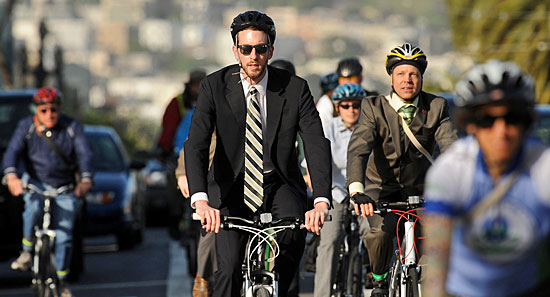Hot new workplace accessory: a bike
May 9, 2013

Bike to Work Day is Thursday, but cycling to work is increasingly common on any given day in Los Angeles.
Bike commuting appears to have turned a corner in Los Angeles, with new lanes and a burgeoning youth-oriented bicycle culture tempting more and more workers to saddle up.
“I think we have reached a tipping point,” said Lynne Goldsmith, manager of Metro’s bicycle program.
Next Thursday, May 16, is Bike to Work Day—one part of Bike Week, Metro’s annual celebration of pedal power. Metro and local advocates are expecting thousands of cyclists to participate. They hope some will shift their commuting habits for good.
Goldsmith said the number of trips taken by bicycle in the county, for commuting or otherwise, has doubled since 2010. She believes the change is partly due to economic necessity and partly because cycling has become trendy with the younger generation.
“We don’t think it’s going to go out of style,” Goldsmith said. “I think it’s here to stay.”
Josef Bray-Ali, owner of Flying Pigeon Bikes in Northeast L.A., seconded that notion.
“Fewer young people are getting driver’s licenses,” said Bray-Ali. “We have an economic crisis. A bunch of people may not be able to afford a car, but they can get a bike.”
Bray-Ali said “fixies”—single-gear bikes decked out with bright colors and other design details—have become wildly popular among the younger generation. “They buy fixies to knock around town with friends, but then they get jobs or go to college,” he said. The cycling habit follows them, and eventually they upgrade to higher-end bikes with commuter-friendly features like chain guards and rear-mounted racks.
UCLA’s experience supports this trend. Since 2005, the number of students and employees commuting to campus has tripled, said Dave Karwaski, associate director of transportation for the school. A desire for a healthy lifestyle combined with new infrastructure played a large part in that change, he said. UCLA is already a bronze-level “Bicycle Friendly University,” according to the League of American Bicyclists. Over the next few years, the university intends to make further improvements to get to a silver or even a gold rating.
Experienced bike commuters like Jeff Chapman echo the importance of infrastructure. For him, safety is paramount—he often tows his young children to school by bike. But, as director of the environmentally-conscious Audubon Center of Highland Park, he also appreciates the fact that pedal power is non-polluting.
He said his kids really enjoy the ride, too.
“They are learning directions better and we see cats along the way,” said Chapman. “They’re interacting with the community in a different way than they do in the back of a car.”
Another bike commuter, Cy Eaton, has cycled in lots of cities—New York, San Francisco, Portland, Chicago and Vancouver, to name a few. “In terms of that list, L.A. ranks toward the bottom,” he said. “But that’s a pretty stout list to compete against.” Since moving here, he’s had to upgrade to sturdier tires because flaws in the asphalt were giving him too many flats. He said the surface of most bike lanes in L.A. is “very disappointing.”
Still, Eaton notices a lot of improvement around town. Having previously lived in Los Angeles in 2008, he moved back last year. His current commute takes him 8 miles in each direction between East Hollywood and Burbank. He’s not riding in fear like he used to.
“I was pleasantly surprised with how aware motorists have become of cyclists,” said Eaton, adding that bikes on the road are no longer a “novel occurrence” in L.A.
For its part, Metro is using education to create a safer experience. The agency’s “every lane is a bike lane” campaign aims to inform drivers that bikes have the right to a full lane of roadway in some circumstances. In June, the target audience shifts to the cyclists. Joining forces with the L.A. County Bicycle Coalition and Bike San Gabriel Valley, Metro will use a federal grant to fund 90 three-hour safety lessons, through September. Participants will receive free helmets and bike lights as a bonus.
Metro’s Goldsmith said that, in the future, “the nut we have to crack is businesses. We need to convince businesses that they will grow if they encourage bicycling on their block.”
Just like in the streets, indoor infrastructure like bike lockers and showers is important to getting more people to cycle to work, said Linda Lyles, executive director of Century City Transportation Management Organization.
To draw more newbies out for Bike to Work Day, Metro is sponsoring bicycle pit stops with snacks, water, reflective decals and other giveaways. Those who sign a pledge to bike to work that day will be entered into a prize drawing, and all riders with a bike and a helmet will be able to board Metro and other regional transit providers for free.
Posted 5/9/12












 405 bridge work causes a stink
405 bridge work causes a stink

